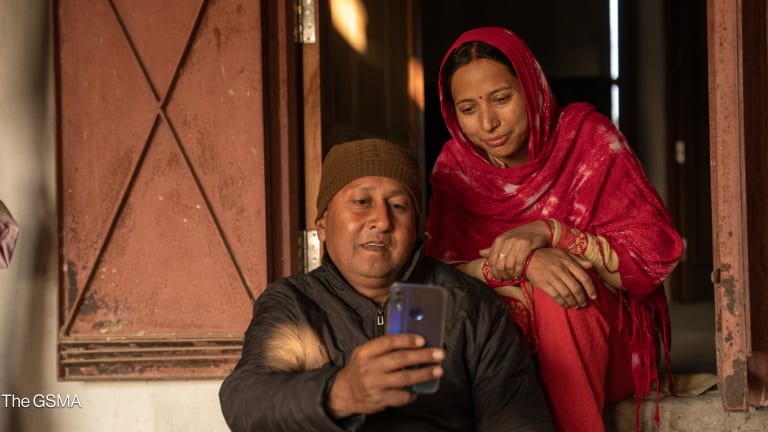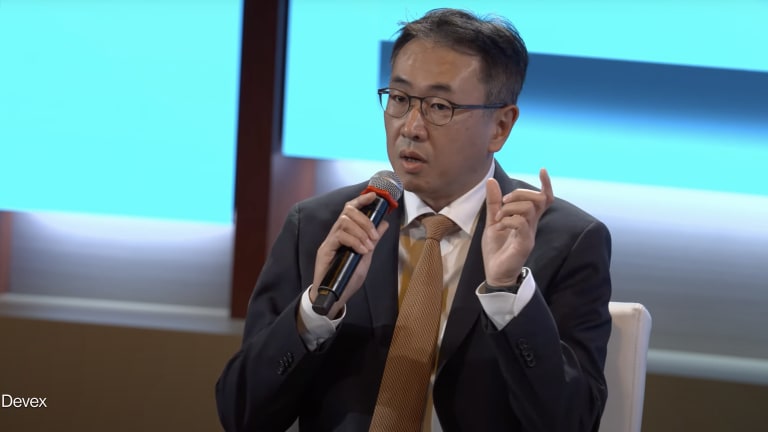For more than two years, champions of the EDISON Alliance, a global coalition of business, public sector and nongovernmental stakeholders launched in 2021, have worked together to improve 1 billion lives by making digital services like remote health care, online banking, and distance learning available to people who were removed from the digital economy. At the 2023 World Economic Forum annual meeting in Davos, the coalition announced it had so far reached 454 million people — more than 45% of the commitment they call the “1 Billion Lives Challenge.”
“One billion is a lot of people and our objective with that is to be extremely concrete. It's not to make a high-level statement, it’s about demonstrable results,” said Rima Qureshi, executive vice president and chief strategy officer at Verizon and deputy chair of the EDISON Alliance. Verizon is a founding member of the consortium alongside Apollo Hospitals, Mastercard, Vista Equity Partners, the government of Rwanda, and the United Nations Development Programme.
1 Billion Lives Progress — Impact Report 2023
At the World Economic Forum annual meeting in January, the EDISON Alliance released its first Impact Report, quantifying the number of lives improved so far through 1 Billion Lives Challenge efforts. Highlights from the report include:
• 454 million people impacted through 250 initiatives across 90 countries (45% of the Alliance’s commitment through 2025).
• More than 150 digital leaders have joined the Alliance since September 2021.
• 280 million people have gained access to digital financial services, such as e-banking, mobile wallets, and e-payments.
• 90 million people have gained access to digital health care services such as remote/connected care, telehealth platforms, and telemedicine services.
• 18 million people have gained access to online quality education, remote learning solutions, and job skills training.
The Alliance was formed out of the conviction that access to online services and broadband networks is an essential feature of 21st century life, and that communities without it would be unable to fully participate in global society. While 95% of the world’s population lives within reach of broadband networks, a lack of accessibility, affordability, and usability has kept 2.7 billion people offline. That’s a third of the world’s population. To help achieve the United Nations’ Sustainable Development Goal 9, which calls for greater access and affordability of information, communications, and technology services, each member of the Alliance has contributed their resources and expertise — from Mastercard providing 25 million women entrepreneurs with solutions that can help them grow their businesses to Apollo Hospitals providing remote health care services to 36 million people.
Speaking to Devex, Qureshi shared how the Alliance plans to accelerate its work past the halfway mark, how stakeholders can join the Alliance, and which hurdles impacting digital inclusion remain.
This conversation has been edited for length and clarity.
The 1 Billion Lives Challenge is purposefully ambitious, so how do you quantify the necessary milestones for success?
Affordability is the biggest challenge and tackling it is our key objective right now. The solution to this differs by country and community, and needs to be addressed by both the public and private sectors. Because these issues are so complex and nuanced, our focus is to bring the public sector, private sector, and governments together to address affordability in practical ways around the world.
Another barrier we look at is accessibility. In some cases, this means finding solutions so that governments and the private sector can invest in connecting communities that are near broadband networks, but not yet hooked up. In some cases, that will involve infrastructure investment. Or, there might be technology solutions like fixed wireless access or satellite internet.
Then, we have to address usability, and this is another issue that is community-based, yet globally important. How do you ensure that there are local applications, in the local language, that are able to meet the needs of everyone? Whether you're in the U.S., Africa, Latin America, or Asia, online services should be easy to use and relevant to people’s lives.
Again, much of this is local. So the Alliance started its “Lighthouse Countries” project. The objective of a Lighthouse Country is to become a beacon for the world. Each Lighthouse Country has a government that has stepped up to say, “we want our country to be accessible and we want to make sure that everybody within our country is connected and has all of the health, education, and financial services that are needed.” Rwanda, Bahrain, and Bangladesh were the first of the Lighthouse Countries and are showing the world what can be done with mobile payments, remote health care, and education. Following these examples, we are working with more countries to bring on as partners.
How do the needs and goals of the Lighthouse Countries fit into the framework of accessibility, affordability, and usability that you described?
Our work with the government of Rwanda is a great example. The government’s goal is to bring all of its people online and to facilitate digital payments to make its economy more efficient and inclusive. But this is impossible if more than 80% of the population cannot afford handsets. This is how we realized that, for Rwanda, we needed to focus on affordability. As we address affordability, we end up addressing accessibility and usability as well.
The government's involvement and commitment is extremely important. Solutions are reached by working together to solve problems in real time and to address issues at the community level, while learning lessons that we can hopefully apply elsewhere.
How would you encourage others to take part in the work of the Alliance?
I would encourage interested organizations to embrace the ambition behind the 1 Billion Lives Challenge, to think about how and where your organization can make the most effective impact and then to consider that by joining the EDISON Alliance, you really can reach that many people because you won’t be working alone.
The EDISON Alliance is focused on achievable commitments and results. We’re looking to make a concrete impact and bring the public and private sectors together to collaborate to solve the digital inclusion gap.
And to anyone considering joining, it’s important to note that we are trying to build lasting solutions, not pilot programs that go away when the funding runs out or some other issue commands the world’s attention. We want to implement commercially viable solutions that will sustain themselves and grow to make digital inclusion a reality for everyone. We are working on lasting change.
For more information on the work of the EDISON Alliance, visit https://www.edisonalliance.org/home








